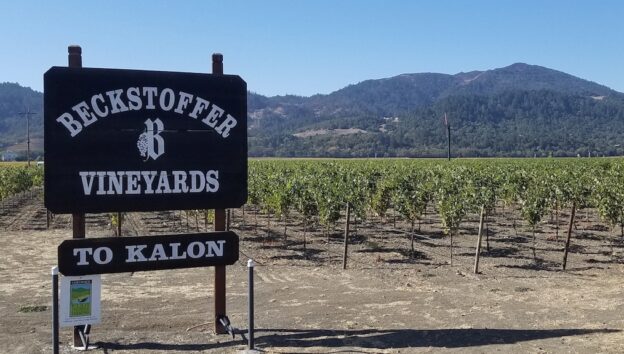To-Kalon (pronounced toe-kah-lon) is one of the most historic, famous and disputed names in Napa Valley history. Is it a vineyard? Is it a brand? Some of the Valley’s most prestigious personalities – Robert Mondavi and Andy Beckstoffer – have been battling each other over these questions for decades.
Why is this specific piece of land in Napa Valley’s Oakville AVA so special? Here the soils have a high portion of gravel, which makes them free-draining, forcing vines to root deeply in search of water. When vines struggle, they become healthier, more resistant to drought and disease, and produce lower yields of better quality fruit.
Some of the best, most prestigious wines in Napa Valley come from the To-Kalon vineyard, which is reflected in very high price tags. Today, there are eight owners of the parceled off vineyard – Mondavi, Opus One, MacDonald, Detert, Andy Beckstoffer, U.C. Davis, Wilsey/Traina and the Napa Valley Grape Growers. Opus One sells $300/bottle, Schrader’s Beckstoffer To-Kalon sells for $400, and MacDonald sells for $700.
In the beginning…
It all began in 1868 when Hamilton Walker Crabb purchased 240 acres of farmland in Oakville. He planted the land with a wide variety of experimental grape vines and named it Hermosa Vineyards. In 1881 he purchased an adjoining 119 acre parcel of land and renamed the business To-Kalon, meaning “the place of highest beauty” in Greek. In 1891, he expanded for a third time, adding on another 135 acres. He became the third largest winemaking in Napa at the time and garnered both domestic and international claim for his wines.
In 1899 Crabb died and his land was fragmented and sub-parcels changed hands a number of times until Robert Mondavi began purchasing plots of To-Kalon in 1966. He started with a 12-acre parcel and by 1978 was the majority owner of Crabb’s original 1881 plot. In 1988, Mondavi trademarked the name “To-Kalon” and in 1994 trademarked “To-Kalon Vineyard”. Today, the majority of the vineyard as well as the trademarks are owned by the behemoth, Constellation Brands, due to its purchase of Robert Mondavi in 2004.
The battle ensues…
The second largest holder was Beaulieu Vineyards with 89 acres. This parcel was purchased by famous Napa grapegrower, Andy Beckstoffer, in 1993 who sold grapes from this parcel to other winemakers. Beckstoffer convinced Schrader Cellars to label their wine “Beckstoffer Original To-Kalon Vineyard.” Mondavi then sued Schrader for use of the To-Kalon name.
Both Schrader and Beckstoffer filed separate counter suits on the basis that To-Kalon is a place, not a marketing concept. Beckstoffer argued that Mondavi was misleading consumers by labeling their wines “To-Kalon” when the grapes being used were not from the original Crabb vineyard.
The conclusion…
The suit was settled in 2003 under undisclosed terms, but Beckstoffer reserved the right to allow his clients to use the To-Kalon name. The result has led to labeling confusion. Wines made from Beckstoffer’s grapes using the To-Kalon label are subject to labeling laws based on geographic location, meaning 95% of the grapes in such a bottle must be from the To-Kalon vineyard.
However, since Mondavi’s claim to the name is based on a marketing trademark, it is not subject to the same rules. So Mondavi may use the To-Kalon name on any bottle it desires, regardless of where those grapes come from! Constellation’s position is that To-Kalon is not a place, regardless of the historical records that suggest otherwise.
There are two other owners of smaller parcels of Crabb’s original To-Kalon vineyard – MacDonald and Detert – highly acclaimed, family-owned wineries that are not allowed to use the To-Kalon name on their wines.
But wait, there’s more!
In 2017, Constellation started a new wine brand called To-Kalon Vineyard. They attempted to file further trademarks on the To-Kalon name, but Beckstoffer put up firm opposition in court and Constellation abandoned the effort.
MacDonald has also filed a petition to have the To-Kalon vineyard added to the National Registry of Historic Places, which is being fought by Constellation. At the same time, a suit was filed against Constellation by The Vineyard House (owned by Far Niente and Nickel and Nickel proprietor, Jeremy Nickel) claiming that Robert Mondavi’s To-Kalon trademark was obtained fraudulently and deceptively. The suit was dismissed by a federal judge, but Constellation in turn sued The Vineyard House for their use of To-Kalon on one of their wine labels.
Constellation continues to adamantly support the position that To-Kalon is a brand, not a place. While defenders of the vineyard, MacDonald and Beckstoffer, are concerned the original vineyard and its special terroir will be forgotten someday due to these trademarks being used on wines that can originate anywhere.





